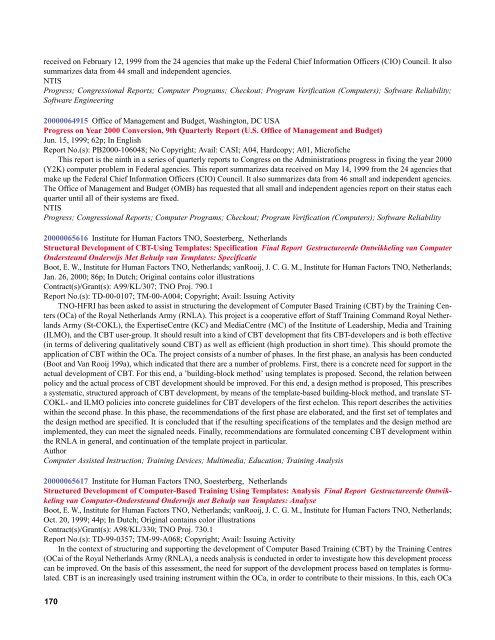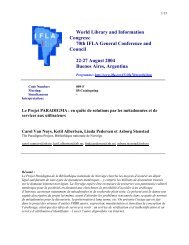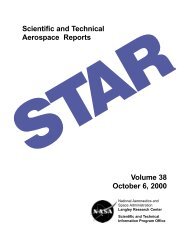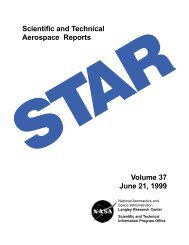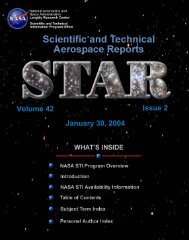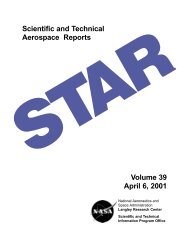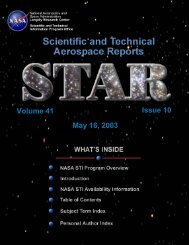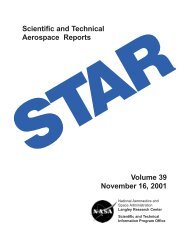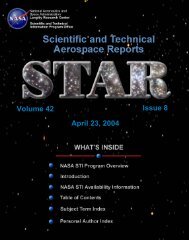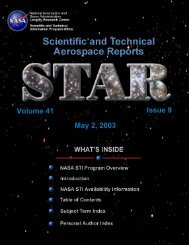Scientific and Technical Aerospace Reports Volume 38 July 28, 2000
Scientific and Technical Aerospace Reports Volume 38 July 28, 2000
Scientific and Technical Aerospace Reports Volume 38 July 28, 2000
You also want an ePaper? Increase the reach of your titles
YUMPU automatically turns print PDFs into web optimized ePapers that Google loves.
eceived on February 12, 1999 from the 24 agencies that make up the Federal Chief Information Officers (CIO) Council. It also<br />
summarizes data from 44 small <strong>and</strong> independent agencies.<br />
NTIS<br />
Progress; Congressional <strong>Reports</strong>; Computer Programs; Checkout; Program Verification (Computers); Software Reliability;<br />
Software Engineering<br />
<strong>2000</strong>0064915 Office of Management <strong>and</strong> Budget, Washington, DC USA<br />
Progress on Year <strong>2000</strong> Conversion, 9th Quarterly Report (U.S. Office of Management <strong>and</strong> Budget)<br />
Jun. 15, 1999; 62p; In English<br />
Report No.(s): PB<strong>2000</strong>-106048; No Copyright; Avail: CASI; A04, Hardcopy; A01, Microfiche<br />
This report is the ninth in a series of quarterly reports to Congress on the Administrations progress in fixing the year <strong>2000</strong><br />
(Y2K) computer problem in Federal agencies. This report summarizes data received on May 14, 1999 from the 24 agencies that<br />
make up the Federal Chief Information Officers (CIO) Council. It also summarizes data from 46 small <strong>and</strong> independent agencies.<br />
The Office of Management <strong>and</strong> Budget (OMB) has requested that all small <strong>and</strong> independent agencies report on their status each<br />
quarter until all of their systems are fixed.<br />
NTIS<br />
Progress; Congressional <strong>Reports</strong>; Computer Programs; Checkout; Program Verification (Computers); Software Reliability<br />
<strong>2000</strong>0065616 Institute for Human Factors TNO, Soesterberg, Netherl<strong>and</strong>s<br />
Structural Development of CBT-Using Templates: Specification Final Report Gestructureerde Ontwikkeling van Computer<br />
Ondersteund Onderwijs Met Behulp van Templates: Specificatie<br />
Boot, E. W., Institute for Human Factors TNO, Netherl<strong>and</strong>s; vanRooij, J. C. G. M., Institute for Human Factors TNO, Netherl<strong>and</strong>s;<br />
Jan. 26, <strong>2000</strong>; 86p; In Dutch; Original contains color illustrations<br />
Contract(s)/Grant(s): A99/KL/307; TNO Proj. 790.1<br />
Report No.(s): TD-00-0107; TM-00-A004; Copyright; Avail: Issuing Activity<br />
TNO-HFRI has been asked to assist in structuring the development of Computer Based Training (CBT) by the Training Centers<br />
(OCa) of the Royal Netherl<strong>and</strong>s Army (RNLA). This project is a cooperative effort of Staff Training Comm<strong>and</strong> Royal Netherl<strong>and</strong>s<br />
Army (St-COKL), the ExpertiseCentre (KC) <strong>and</strong> MediaCentre (MC) of the Institute of Leadership, Media <strong>and</strong> Training<br />
(ILMO), <strong>and</strong> the CBT user-group. It should result into a kind of CBT development that fits CBT-developers <strong>and</strong> is both effective<br />
(in terms of delivering qualitatively sound CBT) as well as efficient (high production in short time). This should promote the<br />
application of CBT within the OCa. The project consists of a number of phases. In the first phase, an analysis has been conducted<br />
(Boot <strong>and</strong> Van Rooij 199a), which indicated that there are a number of problems. First, there is a concrete need for support in the<br />
actual development of CBT. For this end, a ’building-block method’ using templates is proposed. Second, the relation between<br />
policy <strong>and</strong> the actual process of CBT development should be improved. For this end, a design method is proposed, This prescribes<br />
a systematic, structured approach of CBT development, by means of the template-based building-block method, <strong>and</strong> translate ST-<br />
COKL- <strong>and</strong> ILMO policies into concrete guidelines for CBT developers of the first echelon. This report describes the activities<br />
within the second phase. In this phase, the recommendations of the first phase are elaborated, <strong>and</strong> the first set of templates <strong>and</strong><br />
the design method are specified. It is concluded that if the resulting specifications of the templates <strong>and</strong> the design method are<br />
implemented, they can meet the signaled needs. Finally, recommendations are formulated concerning CBT development within<br />
the RNLA in general, <strong>and</strong> continuation of the template project in particular.<br />
Author<br />
Computer Assisted Instruction; Training Devices; Multimedia; Education; Training Analysis<br />
<strong>2000</strong>0065617 Institute for Human Factors TNO, Soesterberg, Netherl<strong>and</strong>s<br />
Structured Development of Computer-Based Training Using Templates: Analysis Final Report Gestructureerde Ontwikkeling<br />
van Computer-Ondersteund Onderwijs met Behulp van Templates: Analyse<br />
Boot, E. W., Institute for Human Factors TNO, Netherl<strong>and</strong>s; vanRooij, J. C. G. M., Institute for Human Factors TNO, Netherl<strong>and</strong>s;<br />
Oct. 20, 1999; 44p; In Dutch; Original contains color illustrations<br />
Contract(s)/Grant(s): A98/KL/330; TNO Proj. 730.1<br />
Report No.(s): TD-99-0357; TM-99-A068; Copyright; Avail: Issuing Activity<br />
In the context of structuring <strong>and</strong> supporting the development of Computer Based Training (CBT) by the Training Centres<br />
(OCai of the Royal Netherl<strong>and</strong>s Army (RNLA), a needs analysis is conducted in order to investigate how this development process<br />
can be improved. On the basis of this assessment, the need for support of the development process based on templates is formulated.<br />
CBT is an increasingly used training instrument within the OCa, in order to contribute to their missions. In this, each OCa<br />
170


